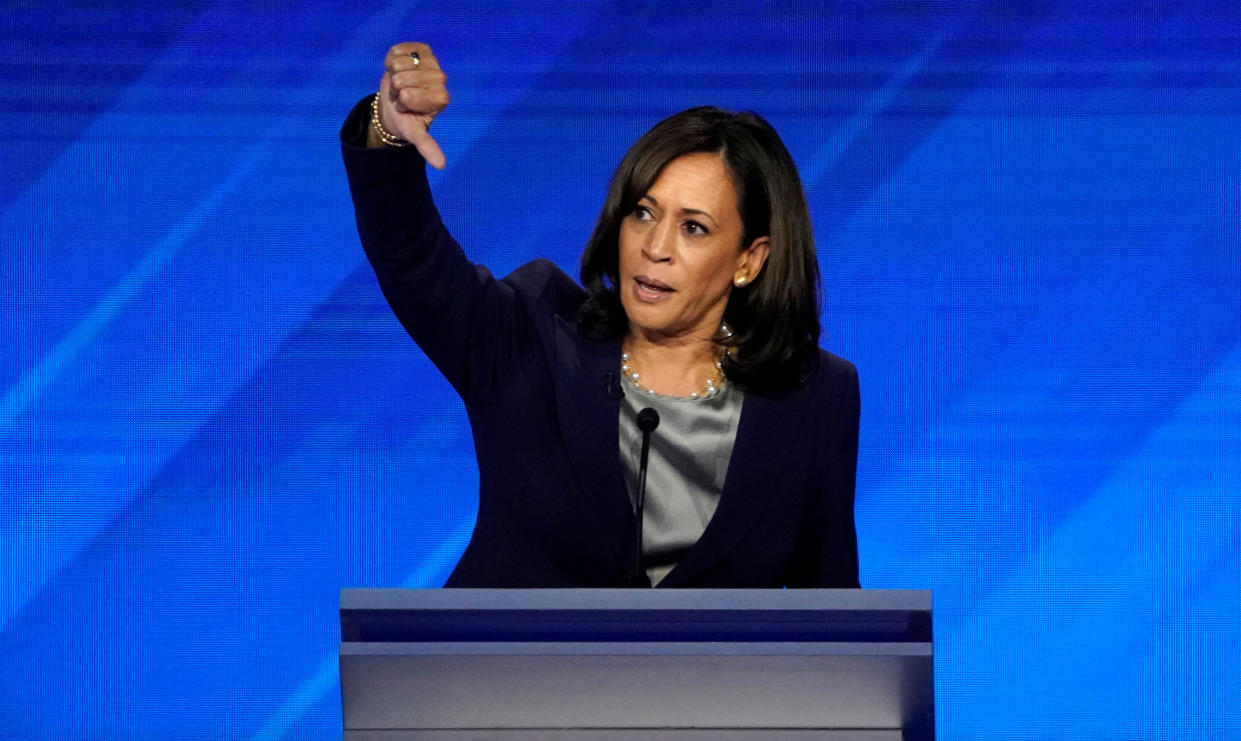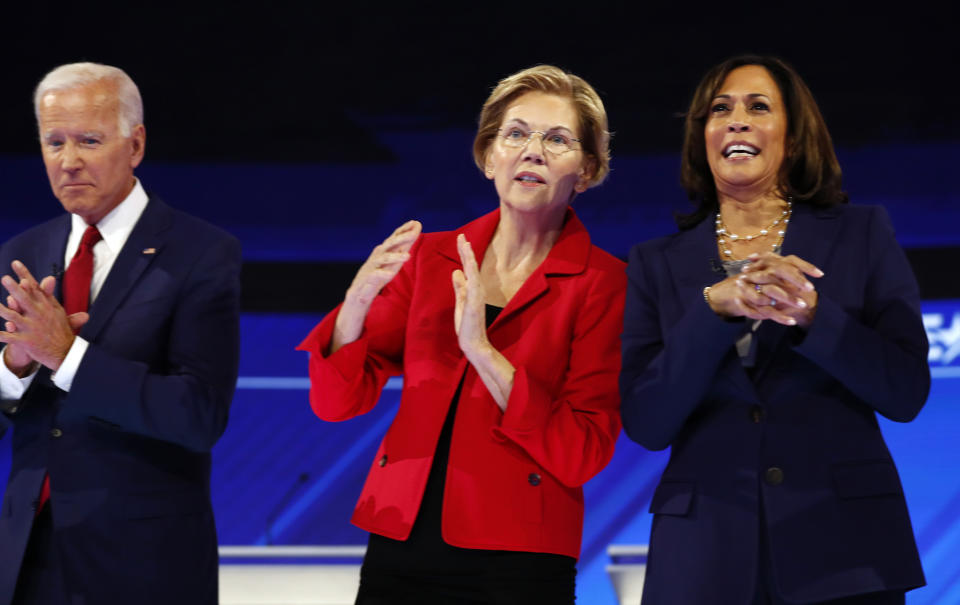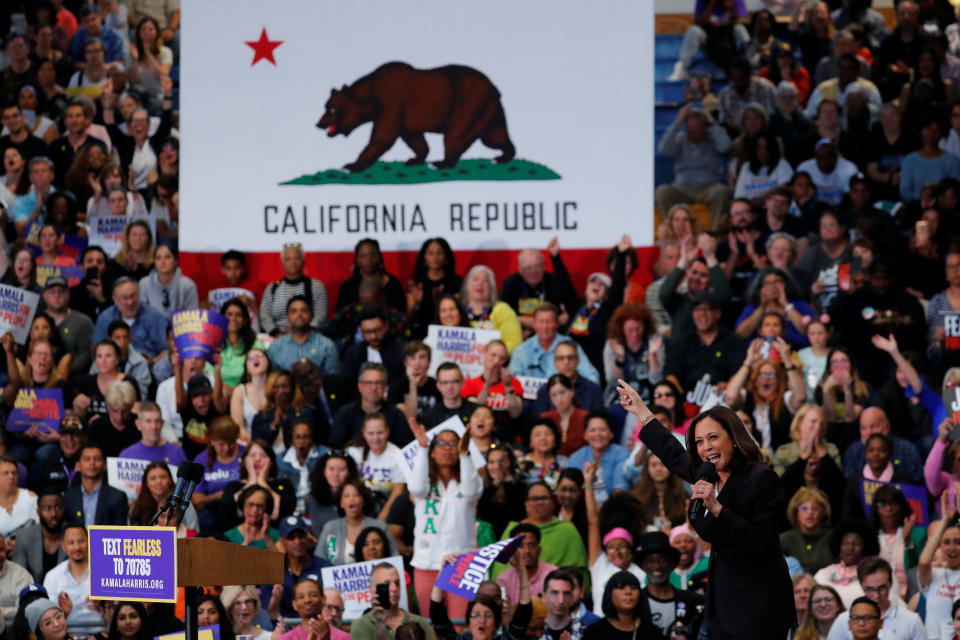2020 Vision Thursday: Why Kamala Harris is struggling in the polls

Welcome to 2020 Vision, the Yahoo News column covering the presidential race with one smart, fast takeaway every weekday and a deeper roundup every weekend. Reminder: There are 137 days until the Iowa caucuses and 411 days until the 2020 election.
Is Kamala Harris’s “summer slump” giving way to an autumn freefall?
Pundits have been speculating about the state of the California senator’s campaign ever since one of her staffers accidentally left an internal briefing memo that included the phrase “summer slump” at a Manchester, N.H., restaurant earlier this month.
They have pointed out that after starting strong in January (with a crowd of 20,000 at her announcement rally) and getting stronger in June (with a debate-stage evisceration of Joe Biden that briefly propelled her into second place in polls), Harris has struggled to maintain altitude, descending from an average of 15.2 percent nationally to less than half that number today.
None of which is all that unusual in a presidential primary — the polling fluctuations, the breathless commentary, the premature obituaries. After all, unlike general election opponents, those in a primary mostly back the same policies, and it’s easy for voters to repeatedly change their mind based on the weekly news cycle.
But the latest round of bad news seems different.
On Tuesday three key primary polls were released to the public. The first, by NBC and the Wall Street Journal, was national; it showed Harris plummeting from 13 percent in July to 5 percent in September, putting her in fifth place, behind Pete Buttigieg, and only a single percentage point ahead of Andrew Yang. No other major candidate lost significant ground in the NBC/WSJ poll; in fact, Biden gained 5 points and Elizabeth Warren gained 6.

The second poll, commissioned by Focus on Rural America and conducted by Harris’s own chief pollster, took the temperature of Democratic primary voters in Iowa. It showed an even bigger decline for Harris than the new national poll: a loss of 13 percentage points between July and September. In that poll Harris now ranks sixth, behind Amy Klobuchar.
The third and final poll, meanwhile, came out of California — Harris’s home state. Conducted by Emerson, it showed Biden and Bernie Sanders tied at 26 percent, with Warren trailing at 20. Next in line was Yang with 7. Harris was in fifth with 6.
Together, Harris’s new numbers suggest a grim new narrative.
Before, it seemed like the California senator was a formerly first-tier candidate who had slipped into the second tier but who was nonetheless poised to “make a comeback,” as David Leonhardt of the New York Times recently wrote.
Now it seems like Harris has fallen further — not just nationally but in both the country’s first caucus state, where highly informed voters are following every twist and turn of the campaign, and in her home state, which votes on Super Tuesday.
If Harris’s loss of altitude is really accelerating — and only additional polling can say for sure — the $64,000 question is why. The pundits’ advice, as summarized by Leonhardt, is to come up with a better message, to “develop a clearer theory of her campaign’s case.”

That sounds fine on paper. But it ignores a few practical realities. A message, it turns out, is only as good as the actual votes it wins you, and Harris may be running out of votes to win. Biden is garnering much of the black vote; at the other end of the Democratic spectrum, Warren is enrapturing the college-educated progressive vote with her promises of “big, structural change.” And Sanders has been a major left-wing force in the race as well. The assumption seems to be that Harris can craft and convey some sort of message that galvanizes the voters in between Biden and Warren/Sanders, but if the frontrunners consolidate their support, the space to thread that needle shrinks. It may be that there just isn’t some sort of magical message that will suddenly create a constituency for Harris.
The truth is, Harris — unlike Warren, Sanders or even Biden — hasn’t run a message campaign. Instead she’s run a moment campaign. Remember, she initially captured the national spotlight by aggressively interrogating President Trump’s Cabinet appointees and watching as videos of her prosecutorial prowess went viral. Lesson learned: That’s largely how she’s conducted herself on the trail.
In the first round of debates, Harris’s moment-making politics paid off. But subsequent developments, including walk-backs on busing and health care, showed that moments are a shaky foundation to build a presidential campaign on. The good ones always fade — and they leave behind a vacuum for the bad ones to fill.

It is a particularly worrisome sign for Harris, then, that all three polls released Tuesday were taken after the last Democratic debate, where she tried to create another moment by cracking jokes onstage and addressing Trump directly. The result? According to a fourth poll, this one by Ipsos and FiveThirtyEight, Harris lost 2.5 percentage points of overall support during the debate (more than any other candidate) and 4.6 percentage points (also more than any other candidate) among voters who prize electability above all else.
“It’s been grim,” a source close to a top California fundraiser said Wednesday in a CNBC story about how Harris’s performance failed to impress big Democratic donors. “There was too much odd laughter and canned lines.”
And that’s the problem with running a moment campaign. It isn’t just that the rewards are fleeting; the risks are also high. The harder you try to make a moment, the more people penalize you for falling short.
_____
Download the Yahoo News app to customize your experience.
Read more from Yahoo News:
Kavanaugh book authors: 2020 Democrats had a 'rush to judgment' on impeachment after NYT op-ed
Russia carried out a 'stunning' breach of FBI communications system
Court revives suit alleging Fox News inflicted 'emotional torture' on Seth Rich family
After hours of questioning Lewandowski, Democrats finally land punches






